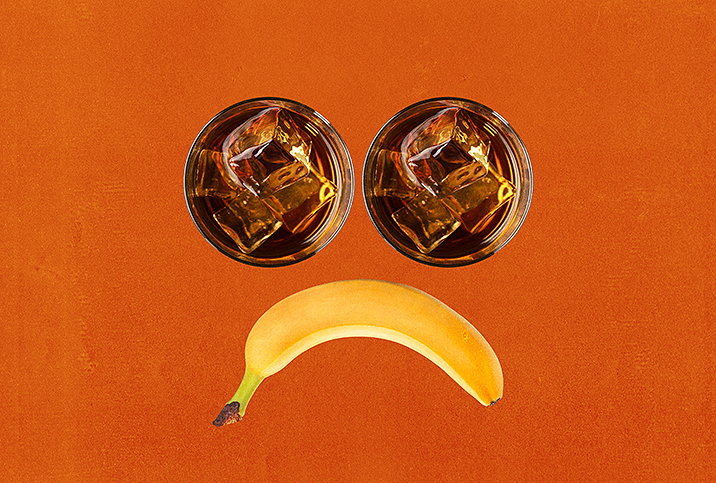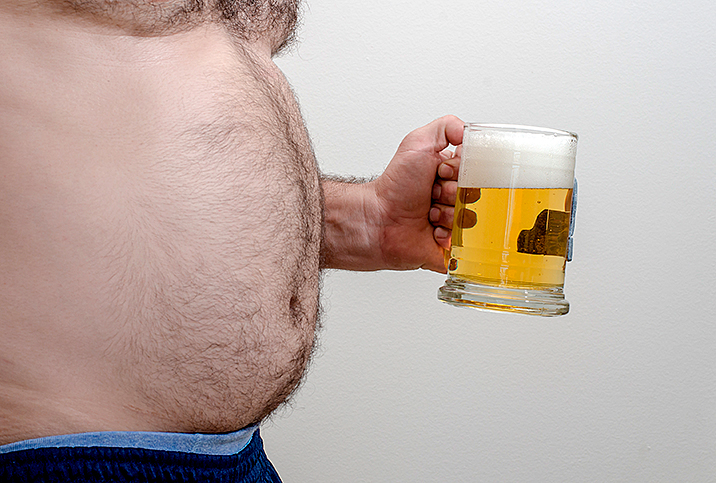Hangovers...And How to Handle Them

We've all been here, sluggishly surfacing toward consciousness with a throbbing skull, reluctantly peeling open our sticky eyes, realizing some small, cruel animal must have pooped in your mouth during the night.
These are hangovers, of course.
Although humans have been using alcohol for thousands of years, we have yet to discover the perfect hangover cure. The truth is—for all our amazing scientific and medical breakthroughs—we still don't really understand what exactly causes a hangover. However, here's what we know about hangovers, including some modern and classic cures, and even a bit of hangover myth-busting.
What even is a hangover?
Different people feel hangovers differently. Body composition plays a role, as does size, age and gender. But there also seems to be a genetic component.
"How each person processes alcohol can vary," said Adnan Said, M.D., faculty member of the University of Wisconsin's Division of Gastroenterology and Hepatology. "But it tends to be pretty consistent: The people who get hangovers keep getting hangovers when they drink similarly, whereas the people who don't get hangovers tend not to get hangovers. The other [factors] that determine whether you get a hangover or not is how much you drank, how fast you drank it and whether you're used to drinking alcohol or not."
But what actually causes a hangover? There are plenty of theories.
Dehydration
While the classic barfly advice is to drink a glass of water between each alcoholic drink to stay hydrated and stave off a hangover, studies show the diuretic nature of alcohol may not be much of a factor.
But hang on, waterboy: There's another reason why drinking water between alcoholic beverages could help.
"When you're feeling full, you don't drink as much," said Niket Sonpal, M.D., assistant professor at Touro College of Medicine and internist and gastroenterologist in New York City. "When you drink water, you don't drink as much alcohol. It's like when you hear that you should drink a glass of water before eating: You feel a little fuller, so you eat less."
Enzymes
In order to process alcohol, your body converts the enzyme NAD+ into NADH. One theory suggests when you have an excess buildup of NADH, your body can't efficiently perform a number of metabolic chores, such as processing glucose or regulating electrolyte levels.
However, recent studies have shown these electrolyte levels don't affect the severity of hangovers, likely debunking this theory.
Toxins
Some theorize hangovers are caused by the buildup of acetaldehyde, a toxin 10 to 30 times more potent than alcohol itself. It's produced when enzymes in the liver begin processing alcohol. The body eventually converts acetaldehyde into a nontoxic compound called acetate, but this process takes time—a rate of one drink per hour to be exact.
"What that means by one drink is one half-ounce of ethyl alcohol," Sonpal said. "That's about the amount of alcohol in one beer, one glass of wine or one shot of tequila. So, say you had more than one drink in an hour, or you had a double or a triple. Now your body is working off that one half-ounce of alcohol, but the other components are still floating around, making you feel loose and gregarious and fun."
If you drink enough, your poor liver might still be processing acetaldehyde hours after closing time.
Hangover cures through history
So, what's the cure? It depends on who you're asking and when:
- Pickled sheep's eyeballs: Mongols during Genghis Khan's reign breakfasted on a pair of pickled sheep's eyeballs to chase away the hangover blues—and likely anything else in their stomach.
- Rabbit poop: Old West cowboys ate rabbit dung to cure hangovers. While the potassium and salts found in rabbit poop may well help replenish what you wiped away while on a bender, maybe opt for a banana instead of bunny pellets.
- Ammonia, skull dust and dried snake: King Charles II swore by a popular hangover cure made of the powdered skull of a recently hanged man, dried viper and ammonia. It also caused bladder stones and killed a fair number of people, so maybe go with ibuprofen instead.
Modern hangover cures
While there's no modern equivalent of sheep's eyeballs or rabbit dung that science points to as a cure for hangovers, there are some preventive measures you can take if you're planning to drink alcohol.
- Avoid congeners. Congeners are substances produced in the fermentation process that flavor and color alcoholic beverages, which are thought to affect hangover severity. Darker liquors like brandy and rum, along with red wine, contain the most congeners, whereas vodka, beer and straight ethanol have the least.
- Eat something before drinking. There's a myth that food "soaks up the booze," which is not quite true. However, Said points out a way food can mitigate some of the effects of drunkenness and, indirectly, hangovers: "The food helps in that, if you drink and you don't eat, you get all that alcohol dumped into your bloodstream within 30 minutes," Said said. "So you get buzzed really fast. If you eat, though, you're still going to get all the alcohol absorbed, but it'll get bound up with the food for a little bit, so you might not get as high as fast."
- Take your vitamin Bs and zinc. It's no cure, but certain vitamins seem to reduce the severity of hangovers. One small study found a correlation between reduced hangover severity and how much zinc and vitamin Bs the drinkers consumed both before and after drinking. If you're someone who is prone to vomiting, maybe increase your zinc intake, too, as it appears to reduce that as well: "Vitamin B1 and thiamine can help protect the liver," Said said. "Vitamin B6 can help protect you from a hangover a little bit."
At the end of the day, the only surefire hangover cure is not to drink in the first place—but if you must booze up, prepare to hunker down and ride it out the day after.
"I think the best thing for a hangover is time and hydration," Said said.
And that sounds better than sheep's eyeballs any day of the week.


















